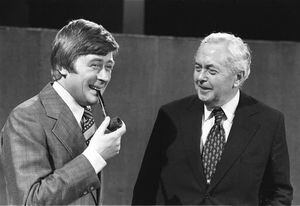Mark Andrews: We con spake proper too, y'know
Recognition at last. I've finally made it. I can already feel the weight lifted from my shoulders.

After years of being lectured about 'privilege', I can now call myself a bonafide, card-carrying victim. A victim of glottophobia. I now feel I belong.
Actually, it's glottophobie, that's a French word. There's no word in the English language to describe my suffering at the moment, but it can only be a matter of time. Once these things take hold, they spread across the world like wildfire.
The French parliament has just passed a law banning discrimination against regional accents. It appears to stem from the French prime minister, Jean Castex, who attracts sneers from Parisians every time he opens his mouth. 'A bit rugby' is the common expression, referring to the fact he is from the south-west of the country where the sport is most popular. France's metropolitan elite is said to describe people with other regional accents as sounding like "they should be reading the weather". Ironically, one of the worst perpetrators of glottophobie is a hard-left politician called Jean-Luc Mélenchon, who you would expect to be red-hot on 'isms' and 'phobias'. But when a journalist with a strong southern accent addressed him recently, he replied: “Can someone ask me a question in French? And make it a bit more understandable.”
Well, speaking as somebody who has endured a fair amount of ribbing over my own regional accent over the years, I guess I ought to be in favour of this.
To be honest, until university it never really occurred to me that I had a regional accent. I'll never forget when my maths teacher, a stern, older gentleman with a deep Welsh lilt, told me he sometimes struggled to understand the local accent.
"I doh 'ave an accent," I replied, privately thinking 'e's a fine 'un to tork'.
Then when I was at university, I remember getting into a debate with a lad from Cheshire, who sneered: "I speak the Queen's English, not Lenny Henry's." I suppose, had I been a bit sharper, I should have retorted: "If we ever gerra a Quayne from Tipton, her'll spake like wot I do." But instead, I meekly pointed out that his accent was just as strong as mine, so it might be an idea to pipe down a bit.
The stupid thing about glottophobie is that there is nobody on earth who does not speak with a regional accent. Received Pronunciation, BBC English, whatever you like to call it, is just as much a regional accent as Scouse, Geordie or Glaswegian, it just happens to be native to the Home Counties, which at this point in time, is where most of the influence seems to lie. It is called BBC English because, in the bad old days, anybody who wanted a career with the broadcaster was expected to speak the same as the people who already worked there. It's always seemed slightly odd that Tony Blair, a Scotsman born and educated in Edinburgh, and representing a constituency i the North-East, considered it necessary to speak like somebody from Abingdon. Or Basildon, when he wanted to sound a bit laddish.
It's also worth pointing out that Samuel Johnson, William Shakespeare and Charles Darwin would all have spoken with Midlands accents of some description – and would presumably have been dismissed as 'Brummies' by the glottophobes – while Received Pronunciation is the accent of David Cameron and Richard Madeley.
I would suggest the former carry more gravitas than the latter.
The problem is though, that while I will defend my Midland accent to the hilt, I don't actually like it that much.
I cringe at the occasions when I have had to speak on television or radio. I recoiled when I watched myself on one of the Downing Street TV briefings in the summer; after a slew of authoritative-sounding people asking very serious questions, I was the comedy turn at the end sounding like I was at an audition for Crossroads.
The irony in this there was once a time when I actually had ambitions for a broadcasting career. Prior to joining this fine organ a quarter of a century ago, I spent four years dabbling in local radio. The problem was that while I might have had the face for it, I definitely had the voice for print journalism. There have been occasions in the past when I considered 'softening' my accent slightly, but ultimately I could never bring myself to do it. It may have helped work-wise, but I'm a stubborn so-and-so, and the truculent side of my personality always resented having to change how I sound just because of other people's prejudices. Besides, it would have cost me money, and I can be dead stingy sometimes.
But my real objection to any anti-glottophobia law is that most of us, myself included, will be as much perpetrators as victims. Would I really want to live in a society where you can be jailed for three years or fined £40,000 for shouting 'cockney baskets' every time a team from the south-east of England visits Villa Park? Would Aynuk and Ayli jokes be designated a hate crime?
And more to the point, where would that leave TV impressionists? "Michael Edward Yarwood, you are hereby charged that between 1964 and 1982 you repeatedly mimicked the Yorkshire dialect of Mr Harold Wilson. How do you plead?"
No, that's not the type of country I would want to part of.
The truth is, you can't legislate for people's attitudes, no matter how narrow-minded they may seem.
Yo've jus' gorra mek the best of it, as we say in the Black Country.





